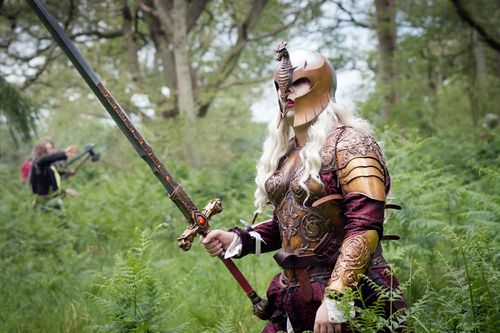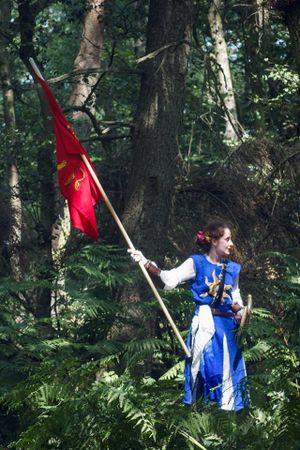Questing knight
| (42 intermediate revisions by 8 users not shown) | |||
| Line 1: | Line 1: | ||
{{CaptionedImage|file=Phoenix Knight.jpg|caption=Questing knights travel far and wide across Dawn, seeking [[glory]].|align=left|width=500}} | |||
==Overview== | ==Overview== | ||
<div id="QuestingKnightsAnchor"></div> | <div id="QuestingKnightsAnchor"></div> | ||
Questing knights are romantic figures in Dawn, knights-errant who continue to pursue an adventurous lifestyle after passing their Test of Mettle, seeking greater glory for themselves and their houses. They travel far and wide across Dawn - a quest isn't just a monster to kill or a people to free from barbarian tyranny, after all, but a long and arduous journey to get there first. | Questing knights are romantic figures in Dawn, [[Knights-errant|knights-errant]] who continue to pursue an adventurous lifestyle after passing their [[Dawn Culture and Customs#The Test of Mettle|Test of Mettle]], seeking greater [[glory]] for themselves and their houses. They travel far and wide across Dawn - a quest isn't just a monster to kill or a people to free from barbarian tyranny, after all, but a long and arduous journey to get there first. | ||
Questing knights strive to embody the high ideals not just of Dawn, but of the quest. If they come to a place where there is a wicked magistrate abusing | Questing knights strive to embody the high ideals not just of Dawn, but of the quest. If they come to a place where there is a wicked magistrate abusing their power, or a monster snatching children away, or an innocent young fellow about to be forced into a marriage he doesn't want, then it is their right and duty to right the wrong. Questing knights who ignore evil or danger that they meet along the way are no better than mercenaries paid coin for their work. Most questing knights prefer to travel in the company of a [[troubadour]], who can document their triumphs. | ||
Some questing knights form groups called knightly orders. A knightly order may create and display their own heraldry | Some questing knights form groups called [[knightly order|knightly orders]]. A knightly order may create and display their own heraldry. Noble membership of most knightly orders is by invitation only, and orders often require solemn oaths, as they have a glorious reputation of their own to protect. | ||
Noble membership of most knightly orders is by invitation only, and orders often require solemn oaths, as they have a glorious reputation of their own to protect. | <div style="float:right; width: 300px; clear: right;">{{CaptionedImage|file=Questing Standard.jpg|caption=A Questing Knight strives to embody the high ideals not only of Dawn, but of the quest itself.|align=right|width=300}}</div> | ||
==Creating a questing knight== | |||
If you want to play a noble character who focuses on achieving glory and avoids the politics of playing in a [[noble house]] then you should consider playing a questing knight. You should decide what noble house your character is part of - questing knights have already passed their Test of Mettle. If you know a group who are playing an existing noble house then you can ask them but you can play a knight who is part of an obscure minor house that is simply part of your own background. | |||
Although the word knight is usually used to describe a warrior, a questing knight can be any noble character - you might be a warrior but you could just as easily be a witch, a musician or a crafter. | |||
If you intend to play a questing knight, it is important to appreciate the large scale of the PD Empire events. You will have epic opportunities for battles as part of a great army fighting the orcs, but you won't be going off on a lone quest to slay a monster. It isn't possible to create that kind of experience for characters at an event where hundreds of players are attending. | |||
If you intend to play a questing knight, it is important to appreciate the large scale of the PD Empire events. You will have epic opportunities for battles as part of a great army fighting the orcs, but you won't be going off on a lone quest to slay a monster. It isn't possible to create that kind of experience for characters at | |||
==Creating a knightly order== | |||
A [[knightly order]] is an order of questing knights, nobles who have completed their Test of Mettle but elected to continue questing together. A knightly order is similar to a noble house, but is less political and more focused on achieving glory. | |||
[[Category:Dawn]] | [[Category:Dawn]] | ||
[[Category: | [[Category:Archetype]] | ||
Latest revision as of 09:17, 22 April 2024

Overview
Questing knights are romantic figures in Dawn, knights-errant who continue to pursue an adventurous lifestyle after passing their Test of Mettle, seeking greater glory for themselves and their houses. They travel far and wide across Dawn - a quest isn't just a monster to kill or a people to free from barbarian tyranny, after all, but a long and arduous journey to get there first.
Questing knights strive to embody the high ideals not just of Dawn, but of the quest. If they come to a place where there is a wicked magistrate abusing their power, or a monster snatching children away, or an innocent young fellow about to be forced into a marriage he doesn't want, then it is their right and duty to right the wrong. Questing knights who ignore evil or danger that they meet along the way are no better than mercenaries paid coin for their work. Most questing knights prefer to travel in the company of a troubadour, who can document their triumphs.
Some questing knights form groups called knightly orders. A knightly order may create and display their own heraldry. Noble membership of most knightly orders is by invitation only, and orders often require solemn oaths, as they have a glorious reputation of their own to protect.
Creating a questing knight
If you want to play a noble character who focuses on achieving glory and avoids the politics of playing in a noble house then you should consider playing a questing knight. You should decide what noble house your character is part of - questing knights have already passed their Test of Mettle. If you know a group who are playing an existing noble house then you can ask them but you can play a knight who is part of an obscure minor house that is simply part of your own background.
Although the word knight is usually used to describe a warrior, a questing knight can be any noble character - you might be a warrior but you could just as easily be a witch, a musician or a crafter.
If you intend to play a questing knight, it is important to appreciate the large scale of the PD Empire events. You will have epic opportunities for battles as part of a great army fighting the orcs, but you won't be going off on a lone quest to slay a monster. It isn't possible to create that kind of experience for characters at an event where hundreds of players are attending.
Creating a knightly order
A knightly order is an order of questing knights, nobles who have completed their Test of Mettle but elected to continue questing together. A knightly order is similar to a noble house, but is less political and more focused on achieving glory.
